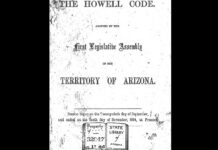In a surprising rebuke of Arizona Gov. Doug Ducey, Arizona Attorney General Mark Brnovich argued in a legal brief issued Friday, Aug. 5, that the governor’s decision to arbitrarily close bars this summer is unconstitutional.
Mooney’s Irish Pub and Vino di Sedona are among the 120 bars collectively suing Ducey over his order. A Superior Court judge is expected to rule on the case this week.
In his brief, Brnovich also raises questions about how Ducey has circumvented the Arizona State Legislature to instead rule by executive order rather than by law passed by elected legislators: “Nearly six months into the declared emergency, it is long past time for the governor to follow the constitution and convene the legislature rather than contravene lawful statutes through executive fiat,” Brnovich states.
Writing on behalf of Brnovich, Chief Deputy & Chief of Staff Joseph A. Kanefield and Assistant Attorney General Brunn “Beau” W. Roysden III argue in Aguila et al. v Ducey, that the “governor’s alleged arbitrary closure of bars (holders of series 6 and 7 liquor licenses) while at the same time permitting similarly situated restaurants (holders of series 12 licenses) to remain open and even exceed the statutory restrictions on their license types” is an unconstitutional abuse of Arizona’s Revised Statute §26-303(E)(1), which grants the governor certain powers in an emergency.
Brnovich argues the governor’s emergency powers are more limited than how Ducey has applied them. Specifically, the “governor can only take actions that are consistent with other statutes and the [Arizona State] Constitution” and that in granting the governor certain powers during an emergency under ARS §26-303, the Arizona State Legislature did not confer “the power to issue orders that are ‘arbitrary, unreasonable and discriminatory.’”
In the 12-page brief, Brnovich goes on to state that the governor’s executive orders unlawfully discriminate between series 6 and 7 liquor license holders and series 12 license holders, “are fundamentally arbitrary and discriminatory” and the court “should declare them unenforceable.”
A series 6 bar license allows for beer, wine and hard liquor consumption on site, while a series 7 bar liquor license allows for just beer and wine consumption on site, and both allow customers to buy unopened containers to take home. A series 12 restaurant license allows for the consumption of alcohol on site, but is only eligible if a restaurant makes “at least 40% of its gross revenue from the sale of food.” A series 12 restaurant license does not allow for the sale of alcohol to be taken home.
While the food sales requirement is a difference, when it comes to how the “bar” serves alcohol to drinking customers, series 6 and 12 licenses are fundamentally identical and a series 7 is nearly identical except for serving only wine and beer.
Incidentally, the sale of off-premise liquor is also a point of contention in the AG’s brief.
When Ducey closed down all bars with an executive order in March, but then allowed restaurants with a series 12 license to sell liquor for takeout along with food, his order violated ARS §4-205.02, which allows bars to make such sales but explicitly forbids restaurants from doing so.
After letting bars and restaurants reopen, in June 29, Ducey ordered bars with series 6 or 7 liquor licenses to “pause operations” except for take-home sales, simultaneously allowing series 12 licensees to stay open for on-site business operations and continue selling take-home liquor and violate ARS §4-205.02.
Ducey’s arbitrary delineation between the types of licenses and what they are permitted to do per executive order “violates the nondelegation doctrine under the state constitution by delegating the entire ‘police power’ of the state to the governor,” Brnovich states.
ARS §26-303 itself is not unconstitutional because it has “two important limits, which prevent an unconstitutional delegation of legislative power.” Brnovich argues that they first be consistent with Arizona state law and be consistent with the Arizona State Constitution.
Brnovich argues that Ducey “can only take actions consistent with other statutes and the constitution, under both the constitutional avoidance and absurdity canons” and the legislature never intended a governor’s use of the statute in an emergency to be “arbitrary, unreasonable and discriminatory.”
Ducey’s abuse of his emergency powers is unconstitutional because the governor ignored these two limitations, Brnovich argues.
Brnovich states the governor has broader powers in a state of war — but Arizona is not at war — and that his narrower executive powers are not consistent with state law.
In crafting his emergency orders, Brnovich also states Ducey has never sought “recommendations for orders, rules, policies and procedures” from the State Emergency Council, a body described in state statute that includes state officials the governor selects as well as the president of the Arizona State Senate, speaker of the Arizona House of Representatives, Arizona Attorney General and Arizona Secretary of State.
Moreover, Brnovich argues that because Ducey’s executive orders include a criminal penalty — threatening violators of his order of being guilty of a class 1 misdemeanor — that they are thus denied substantive due process protected by the constitution.
By arguing that Ducey’s orders arbitrarily impose class 1 misdemeanor penalties on anyone who violates an executive order, the brief also calls into question the constitutionality of executive orders issued by mayors who imposed the same class 1 misdemeanor criminal penalties without due process.
Brnovich cites State of Arizona v. Arevalo, handed down Sept. 1, which made threatening someone a felony instead of a misdemeanor if the suspect was thought to be in a gang. Because the affiliation was merely assumed by police and not proven by a trial, the Arizona Supreme Court ruled it unconstitutional.
When reviewing whether an executive order in an emergency is arbitrary and provides due process, Brnovich states the court should determine:
• The severity of the emergency
• The duration of the executive action without legislative oversight
• The geographical scope of the executive action, and
• The consistency with which emergency measures are ordered
Brnovich also claims Ducey’s Executive Order 2020-43 “appears to be picking winners and losers in the marketplace contrary to the existing statutory and rule structure regarding liquor licenses, which the governor cannot contravene, and in an arbitrary and discriminatory manner and without convening the legislature in extraordinary session in the event the governor determines the existing liquor license statutes and rules prevent him from appropriately addressing the emergency.”
Brnovich argues that the governor’s orders are even more problematic because Ducey has not called the legislature back into session after it adjourned six months ago, accusing him of ruling by fiat.
If Arizona is facing a real crisis, Brnovich writes, Ducey is legally directed to call on the legislature for support: “If the governor cannot faithfully execute existing law in order to manage a public health crisis as mandated” by the Arizona State Constitution, then the constitution directs him to “call the Legislature into an ‘extraordinary session,’ so that the law can be changed.”
In the conclusion, Brnovich argues the legislature did not grant the governor the power to impose “arbitrary, unreasonable and discriminatory powers” nor to exceed his authority and ask the court to rule his orders “unenforceable” to Arizona bars.






















